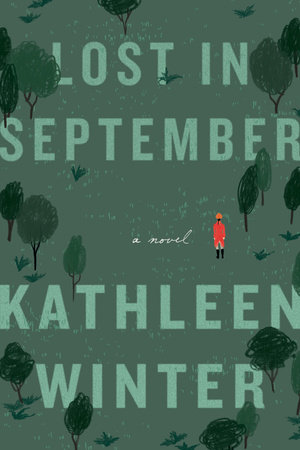Kathleen Winter. Lost in September. Knopf Canada. $29.95, 304 pp., ISBN: 978-0345810120
A Review of Kathleen Winter's Lost in September
Review by Krista Foss
There’s a feeling writers get after being immersed in their work for several hours. Jarred back into their non-writing lives by something banal or urgent — a hungry child, a phone call, a kettle boiling dry — they function with their heads in a bell jar. Sure, the body makes a sandwich or runs an errand, but the imagination’s lost in that other place, the one on the screen or page. And damn, if it doesn’t feel more real.
Lost in September, Kathleen Winter’s second novel, mines this same disorientation, and invites readers to the party, plunging them quickly into a rewarding uncertainty: where’s the boundary between fact and fantasy, past and present, trauma and normalcy?
In September of 1752, James Wolfe was a young British soldier already exhausted by battles against the Jacobite Rebellion and in the War of the Austrian Succession. He was granted a leave to Paris where he planned to fill his days with dance, poetry and music. But that same year, the British switched to the Gregorian calendar, and eliminated eleven days in September, corresponding to Wolfe’s getaway along the banks of the Seine. He never got over being recalled to the army early, even though by the time he made landfall in North America, he’d made a meteoric rise to Major General.
Now it’s 2017, and James re-emerges as Jimmy, a pension-less, homeless war veteran in Montreal, who has those 11 days back. As he steels himself to return to the Plains of Abraham — seven Septembers after his truncated leave, Wolfe died there defeating the French — he’s having a hard time convincing others, including his Mont Royal tent-mate Sophie, that he really is James Wolfe (despite speaking like a man who adores buckled shoes and Hotteterre’s preludes).
Encouragement comes from a crew of colorful characters including a cardigan-wearing writer, Genevieve Waugh, who engages in a spotty correspondence with Jimmy, given he has no postal address. Waugh gives voice to the readers’ is-he-or-isn’t-he dilemma: her reason doubts Jimmy’s reliability though gradually her imagination succumbs.
Winter is a luminous writer. Her prose is chest-thumpingly beautiful, often funny and brimming with compassion. Wolfe’s mother, for instance, is wonderfully imagined. Animated through letters that Jimmy has memorized because there are no surviving copies, Henrietta Wolfe is so tart and psychologically disturbing, it’s a shame she mostly disappears from the book’s latter half.
“What sound has my loneliness?” Henrietta asks in one such letter, before providing the answer:
It’s the long thin needle a curlew flings, that sharp note hidden mid-song. You kill me with that secret needle, suggesting you’ll marry that Lawson woman. What became of your way of leaning your neck on mine when you loved me here in the house?
If bronze casting makes history immovable and jingoistic, Lost in September turns it into a hot paradoxical mess. As a general, James Wolfe systematically targeted civilians, burning their farms, destroying fishing nets, threatening entire villages with starvation and indiscriminate scalping. He was also pallid and weak-chinned, a man who felt bullied into hard-nosed masculinity by his military father and who by all accounts, loved his long-time friend George more than his betrothed.
About two thirds into the novel, Genevieve writes Jimmy to say she is re-reading Erich Maria Remarque’s All Quiet on the Western Front, an account of war that reminds her “…we are in all time at once, that history is now, that we are in an eternal struggle with power and aggression.”
So while Winter’s intrepidness to enter the wormhole of a mind shaken by PTSD and neglect means what’s occasionally lost in Lost in September is momentum, the pay-off is a rich and touching road trip within the multiverse.
Through Jimmy, the writer gives us a soldier — damaged by the front lines, cheated of his humanity and recompense — who can’t help but re-animate a neglected past, because it’s a story still in search of redemption.

